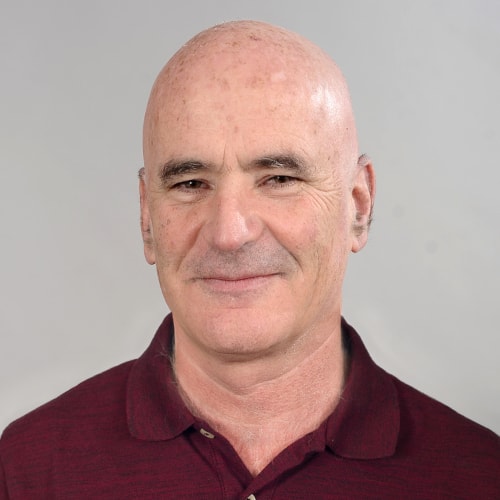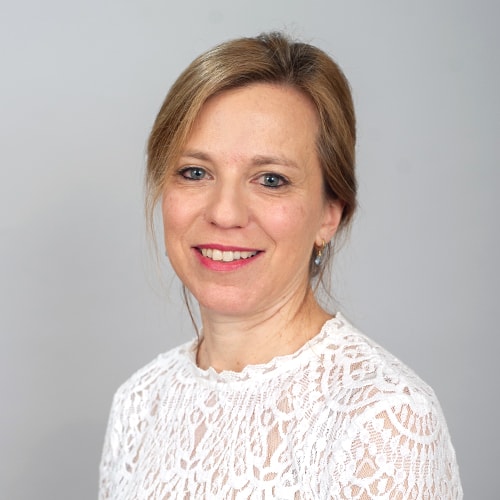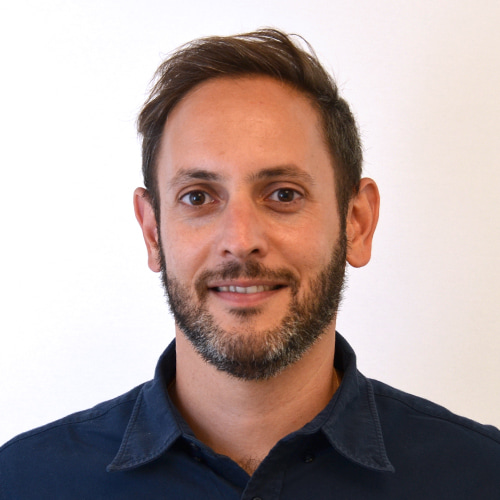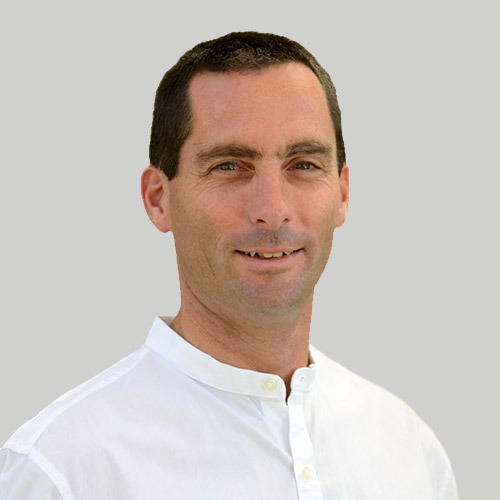At the start of the 2020-2021 academic year, new directors were appointed to head two units and two programs of the Mandel Foundation–Israel. Meet the new directors of the Mandel Center for Leadership in the North, the Mandel Graduate Community, the Mandel Program for Academic Leadership, and the Mandel Youth Leadership Program, who share their visions for their work in their new positions.

Miki Nevo
Director, Mandel Center for Leadership in the North
Miki Nevo, a social entrepreneur, is the director of the Mandel Center for Leadership in the North. Prior to his current position, he was the director of the Mandel Youth Leadership Program of the Mandel Leadership Institute for five years. Miki has some twenty-five years' experience in founding and managing social and educational organizations. He was principal of the Misgav secondary school, and founded and directed the Israel Venture Network’s educational activities in Israel’s northern social periphery. He founded and directed the Ma’ase Center, which promotes socioeconomic mobility by providing volunteering frameworks for young adults from Israel’s social periphery, served as senior assistant director of research and development of the Rashi Foundation, and founded and directed Living Together – The Center for a New Social Partnership in Israel. In recognition of his work with Ma’ase, Miki was awarded the Sderot Conference for Society’s Prize for Excellence in Social Affairs, the Speaker of the Knesset’s Quality of Life Prize, and an honorary doctorate from Tel Aviv University. He holds a bachelor’s degree in computer science and a master’s degree in neurobiology, both from the Hebrew University of Jerusalem. Miki is a graduate of Cohort 4 of the Mandel School for Educational Leadership.
The Mandel Center for Leadership in the North strives to realize the mission of the Mandel Foundation–Israel through a deep understanding of the unique fabric of the North, which is made up of vastly different communities – national religious, ultra-Orthodox, traditional, and secular Jews, Muslim and Christian Arabs, Bedouin, Druze, and Circassians – who live together in the shared space of Israel's northern periphery. We will identify and recruit outstanding fellows who share the desire to achieve a society that is fair and just, and provide them with leadership programs. Over time these programs will achieve optimal coverage of the whole region, in order to have a maximal impact on the North. Our programs, which will address the most significant topics in Israeli life, will be based on a curriculum that emphasizes the humanities.
Our programs will also emphasize leadership in a digital world as well as management skills that will help our graduates to impact the field. Taking a multi-disciplinary approach that includes a variety of perspectives, the programs will also explore the meaning of “community” in our times and the challenges of community building. We will facilitate connections between local populations, the local authorities, and the government, and will strengthen local leadership in both government systems and civil society.

Maya Bozo-Schwartz
Director, Mandel Graduate Community
Maya Bozo-Schwartz is the director of the Mandel Graduate Community and has extensive experience in leading pedagogical change processes in schools and in systemic change processes in education. Before being appointed to her current position, she was the director of the Mandel Leadership Institute's Mandel Program for Academic Leadership. Prior to that, Maya was a member of the management team and head of research and development at Avney Rosha – the Israel Institute for School Leadership. She also worked at the Branco Weiss Institute, where she founded and co-directed its research and development unit. Maya holds a bachelor’s degree from the department of education and from the multidisciplinary program at the Hebrew University of Jerusalem, and has a master’s degree in philosophy of education from the same institution. She is currently working on her doctoral dissertation in the department of education at Ben-Gurion University of the Negev, where her research explores verbal feedback in the school classroom. Maya is a graduate of Cohort 13 of the Mandel School for Educational Leadership.
For many years, I have worked closely with hundreds of teachers and principals to develop their leadership and professional skills. I have seen how educational leaders create bold and meaningful change. But alongside my appreciation for their outstanding achievements, I have come to understand that working with a given principal or school individually, as important as it may be, is not sufficient for achieving real change. The challenges facing the Israeli education system are so daunting, and the difficulties involved in leading change are so complex, that no single leader can do it alone, however talented they may be. In addition to the outstanding principals I have met, there have always been staff members, colleagues, and devoted parents who partnered in the work. In other words, these leaders are surrounded by a community – diverse, strong, and full of partners who speak a similar language and work together to create a new reality.
I view my new position as director of the Mandel Graduate Community as an opportunity to create such an educational-social community – a community whose purpose is to lead change for the better in the Israeli education system and Israeli society, across its different and diverse groups. The Mandel Graduate Community numbers over 1,500 such leaders, who share a common language and way of thinking, as they have grown and developed in Mandel programs and have experienced the unique Mandel learning processes. My task in the coming year is to establish a unit that will be a professional, proactive, attentive, relevant, and high-quality home for the Foundation’s graduates. Its role will be to strengthen the work and impact of our graduates and to provide them with opportunities for cutting-edge learning, professional support, implementation, and networking. I am confident that in this home, we will create a long-term professional partnership that will support each of our graduates throughout their careers, and will help the Mandel Foundation realize its vision.

Ido Barkan
Director, Mandel Program for Academic Leadership
Ido Barkan is the director of the Mandel Program for Academic Leadership. Before joining the Mandel Leadership Institute, he was the head of the school superintendent division and a member of the management of Avney Rosha–The Israel Institute for School Leadership, where he led training and professional development for superintendents working for the Ministry of Education.. In recent years, Ido has served as a senior mentor in the Global Business Studies Program at the faculty of management of Tel Aviv University, an MBA program for outstanding international students. He is also one of the founders of the New School of Holon, a unique public school patterned after High Tech High in San Diego, which focuses on project-based learning. Ido began his career as a strategy consultant at TASC consulting firm. He holds a master's degree in education policy (magna cum laude) from Tel Aviv University and a bachelor's degree from the Amirim program for outstanding students and the cognitive science department of the Hebrew University of Jerusalem. He is a graduate of Advot, a joint venture between the Ministry of Education and MAOZ that aims to create a senior management pipeline for Israel's education system.
For me, leadership is a combination of clear values, high standards of professionalism, and motivation to act. When it comes to education, leadership is an inherent part of the educational act. As Martin Buber wrote: “the influencing of the lives of others with one’s own life – becomes here a function and a law." The Mandel Program for Academic Leadership, which I have the privilege of directing, seeks to cultivate leaders in the field of teacher training in Israel. We help the program’s fellows formulate their professional vision, based on the premise that the nature of Israel’s future teachers is an important element in building a just society. Through interactions with leading researchers and practitioners in Israel and abroad, the fellows return to the field equipped with high-quality professional knowledge that helps them set high standards of professionalism. In the current academic year, we are working closely with the fellows to help them implement their practical initiatives, and are focusing on translating their great ideas into concrete acts of leadership and processes of change. The difficult challenge that we face is that academia is often characterized by conservatism and resistance to change. I believe, however, in the power of a group of leaders who emerge throughout the system to drive change from within.

Dani Rozner
Director, Mandel Youth Leadership Program
Dani Rozner, a social entrepreneur and educator, directs the Mandel Youth Leadership Program. He has 20 years of experience in the fields of education and society, including management positions. During his years of involvement in the social arena, Dani has specialized in promoting social mobility and in bringing the diversity of Israeli society to the fore. He has served as CEO of the "Aharai!" youth organization, as the director of the Ministry of Education's social and youth administration, as a member of the inter-sectoral roundtable at the Prime Minister's Office, and as a member of an advisory board to the Minister of Education. He was also a co-founder of the Israeli Council of Youth Organizations, the initiator and founder of the "People on the Way" social tourism website, growth manager of the riseup profit-with-purpose startup, and a project manager and policy advocate in the realm of Israeli society and in nonformal education. Dani has a bachelor's degree in environmental studies and geography from the Hebrew University of Jerusalem, a master's degree in business administration from the Open University and Ariel University, and a second master's degree in environmental management, planning, and policy and geography from the Hebrew University of Jerusalem. Dani is a member of the boards of the "Aharai!" youth group, the "Looking Forward" association for involving young people from the periphery in leadership positions, the National Union of Israeli Students, the Amit network's 24/7 program.
Throughout my years of social activism, I have worked to reduce social divisions, to shatter glass ceilings, and to allow a broader range of people to feel that they are part of the Israeli experience and that they have the ability to determine their own future and the future of their community. The Mandel Youth Leadership Program works to realize these very same goals, based on the understanding that Israel’s multifaceted society is struggling to create a shared ethos and reach agreement on relations between the groups it comprises, against the backdrop of serious cultural and socioeconomic divisions. The combination of a lack of a shared ethos, a multicultural population in which different groups lead separate, "tribal" ways of life, and the inability of certain populations to create an optimistic picture of the future for themselves based on equal opportunity, is a recipe for the disintegration of the social fabric of Israel.
The Mandel Youth Leadership Program works to develop leaders who are working in the field of non-formal education and have diverse personal and sociological backgrounds. It serves as an important arena for building leadership that advances social cohesion, creates a common language, and fosters a climate that enables the development of a shared life of value in Israel. The program is based on the belief that education is the basis for developing a common good, for recognizing the other, for developing bridges between members of different populations, and for building social solidarity. The program believes that leaders who have a clear and well-defined personal and educational identity, who view their work as a mission, and who are able to plan and implement based on theories of change, are the leaders who will change the world.
